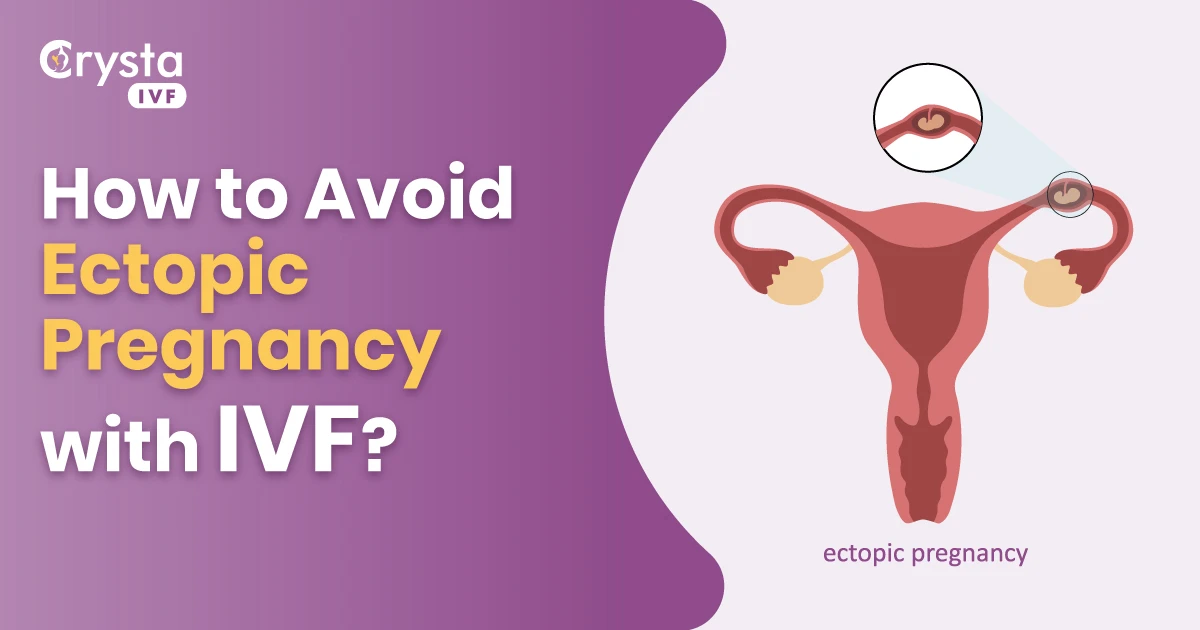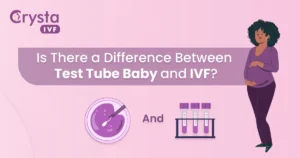If you read about IVF treatment and pregnancy in general, you might have come across the term ‘Ectopic Pregnancy.’ It doesn’t matter if you have or haven’t come across it; you still need to know what it is, how it affects the course of IVF treatment, and how to avoid it.
Ectopic pregnancy is a serious condition, and many people are still unaware of it. So today, this article will walk you through all the information you need on this condition before going through an IVF treatment.
What is Ectopic Pregnancy?
Ectopic Pregnancy is when the fertilized embryo attaches itself outside the uterus, generally somewhere in the fallopian tubes. This condition ultimately results in a pregnancy loss or miscarriage. It may also cause the fallopian tubes to burst if the embryo starts developing inside the tubes. There is no way for the embryo to survive such a condition, as it cannot grow outside the uterus. Early diagnosis and treatment are critical for this condition, as it can lead to fatal complications like tubal rupture.
What causes Ectopic pregnancy?
Although it is hard to determine the exact cause of this condition, many factors may cause an Ectopic pregnancy during IVF Treatment, including some lifestyle habits and underlying medical conditions. Let’s take a look at some common causes of this condition:
Pelvic Inflammatory Disease(PID)
Pelvic inflammatory disease is an infection of the female reproductive organs, such as the uterus, fallopian tubes, ovaries, and cervix. This disease may result in the formation of scars in the fallopian tubes, increasing the risk of an ectopic pregnancy. Early diagnosis of this condition is necessary to avoid complications in the IVF treatment.
Learn More: Pelvic Inflammatory Disease & Its Impact On Fertility
STDs and Infection
Certain sexually transmitted diseases like chlamydia and gonorrhea may increase the risk of reproductive complications and the development of other infections like Pelvic Inflammatory disease. Practicing safe sex and using contraceptives is important to steer clear of these STDs that increase the risk of Ectopic pregnancy.
Hormonal Imbalances
Hormonal Imbalances due to lifestyle habits or medications can affect your fertility and lead to implantation failure. An excessive amount of estrogen or progesterone may result in abnormal contractions or movements in the fallopian tubes. This movement can interrupt the embryo’s journey toward the uterus, and it may get implanted in the fallopian tube, causing an Ectopic Pregnancy.
Tubal Factor Infertility
Tubal factor infertility refers to blockage or damage of the fallopian tubes. This condition is a major cause of implantation failure. It may also cause an ectopic pregnancy if the embryo is unable to travel through the fallopian tubes due to a blockage or damage. It is necessary to get diagnosed with tubal infertility before going through an IVF treatment.
Birth Defects
Certain genetic conditions or birth defects in the reproductive organs may lead to an ectopic pregnancy. The birth defects may include an abnormally shaped uterus or fallopian tubes, blockage in fallopian tubes, etc. Although there is nothing you can do to avoid congenital disabilities, they may be treated with surgical or non-surgical methods.
What are the types of Ectopic pregnancy?
Generally, most Ectopic pregnancies occur in the fallopian tubes. However, it may occur in other areas or reproductive organs such as ovaries or cervix. These are the different types of Ectopic pregnancies:
Tubal Ectopic Pregnancy: The most common type of ectopic pregnancy where the embryo implants itself in the fallopian tubes, generally around the ampullary segment.
Cervical Ectopic Pregnancy refers to a condition where the embryo implants itself in the cervical canal. It is a rare occurrence.
Cesarean Scar Ectopic Pregnancy refers to another rare condition where the embryo gets implanted on a cesarean section scar from a previous delivery. It may be life-threatening.
Ovarian Ectopic Pregnancy occurs when the fertilized egg implants in the ovarian surface. It accounts for 3% of all ectopic pregnancies.
Abdominal Ectopic Pregnancy is when the embryo starts growing within the peritoneal cavity. It is potentially life-threatening and needs immediate medical intervention.
Symptoms: Ectopic pregnancy vs Normal Pregnancy
Although Ectopic pregnancy and normal pregnancy may inhibit the same symptoms in the initial phases, making it harder to diagnose, there are still a few symptoms that differentiate an Ectopic pregnancy from a normal one.
| SYMPTOMS | ECTOPIC PREGNANCY | NORMAL PREGNANCY |
| Bleeding and Spotting | Inconsistent bleeding and spotting patterns, often dark colored. | Light vaginal bleeding and spotting during the 1st and 2nd week |
| Abdominal Cramps or pain | Sharp pain in the abdominal or pelvic area. Severe episodes of cramps and pain. | Mild cramps and abdominal pain are expected. |
| Vomiting and Nausea | Unusual, generally do not occur. | Prominent early symptom of a normal pregnancy |
| Internal Bleeding | It may occur in case of a ruptured fallopian tube | Doesn’t occur. |
If these symptoms start occurring after your embryo implantation during IVF treatment, you should immediately inform and consult with your fertility specialist. Ignoring these symptoms may prove to be fatally dangerous.
Learn More: Understanding Ectopic Pregnancy: Symptoms, Causes, and Treatment Options
Few Tips to prevent Ectopic pregnancy
Although an ectopic pregnancy can’t be avoided, there are a few lifestyle changes and health practices you may adopt to prevent or reduce the chance of an ectopic pregnancy. Here are some important prevention tips:
Quit Smoking
Research shows that smoking can cause damage or disrupt the function of the fallopian tubes. Smoking has been associated with a higher risk of an ectopic pregnancy. It also has adverse effects on overall health and increases the risk of life-threatening diseases like cancer and other heart & respiratory diseases. Hence, if you are a smoker, you should consider quitting now. Quitting smoking will not only help you reduce the risk of an ectopic pregnancy but also improve your overall health.
Practice Safe Sex
Sexually transmitted diseases and infections can increase the risk of ectopic pregnancy. Practicing safe sex, using contraceptives, and maintaining personal hygiene will enable you to steer clear of STDs and, therefore, reduce the risk of ectopic pregnancy.
Maintain a Healthy BMI
A healthy BMI is necessary for a safe pregnancy without complications. Fertility experts usually deem a BMI between 18.5 and 24.5 safe for an IVF Treatment. An overweight or underweight BMI can disrupt hormonal balance and even reduce the quality of eggs in females. These factors may line up and result in an ectopic pregnancy. Maintaining a healthy BMI can help prevent these complications and promote overall health.
Treating Existing PID and STIs
Suppose you have an existing Pelvic Inflammatory Disease or any other STIs like Chlamydia & Gonorrhea or are at risk of having these infections. In that case, you should get diagnosed as soon as possible and treat these conditions before going through an IVF treatment. These infections can significantly increase the risk of an ectopic pregnancy, and it is critical to treat them.
Regular Health checkups
As there are limited ways to avoid or prevent an ectopic pregnancy, it is important to stay updated with your health status and consult with fertility experts before and throughout your IVF procedure. Fertility experts may be able to help prevent and diagnose it or its underlying potential causes and treat them at the earliest.
The Key Takeaway
Ectopic pregnancy is a serious condition and may be a scary thought for people planning to go through IVF treatment. However, taking preventive measures, prioritizing healthy life choices, and keeping a check on your health can significantly reduce the risk of an ectopic pregnancy.
It is also important to choose a fertility center that provides excellent treatment and takes care of other factors like pre-procedural diagnosis, treatment of underlying medical conditions, transparency in communicating complications and offering care & support throughout the process.
If you are looking for a trustworthy fertility center in Delhi, Crysta IVF is the best choice. Our professionals and staff aim to provide the best treatment and care possible to all clients and families. Equipped with some of the best fertility experts in India, we have the trust and confidence of thousands of couples. So, do not wait any longer—book a consultation with Crysta IVF today!
FAQs
Q- Is age a risk factor for ectopic pregnancy during IVF?
Yes. Women over 35 have an increased risk of ectopic pregnancy during IVF treatment compared to younger patients. Increased age also results in decreased quality of eggs and sperm, which may further contribute to ectopic pregnancy or other complications.
Q- When do ectopic pregnancy symptoms start?
Abdominal cramps and other symptoms associated with ectopic pregnancy can exhibit themselves between the 4th and 12th weeks of pregnancy. If you start experiencing these symptoms, immediately seek medical attention.
Q- Is ectopic pregnancy safe?
Not at all. An ectopic pregnancy, occurring in any location or area in the body, can be life-threatening. An embryo can’t survive anywhere except the uterus.




